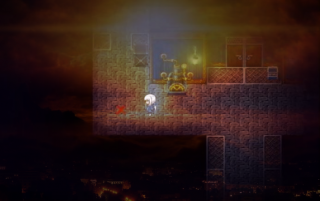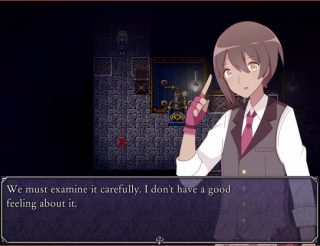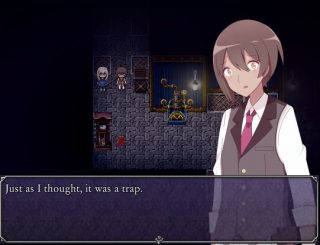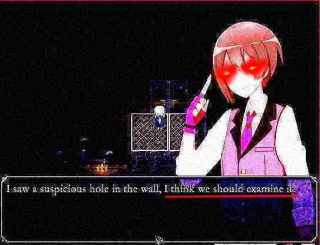Dlin dlon, in the carriage! This will be our second review, Midnight Train.
Actually this is an old review, the second one we did. The review of A Figment of Discord comes after that of Midnight Train, but the game of fate and the numerous circumstances directed us to publish in the Archives, first, just the fragment of discord – as it was later but… Details. This title is unlucky– when we had published it earlier in Itch.Io (see the comment of “tomorrowavenger”).
Well, then? Why are we reviving Midnight Train? Why pick this game?
The reasons lies at the heart of the review, but… From this point on the introduction is in the hands of Ele, the gamer between the two of us…
Mwhahahah! Alright, that was stupid.
To make you understand why we “targeted”, as a malign professor, this title we need to make a little speech here about active viewers, passive viewers, and on how both sides perceive these kinds of games.
But what do I mean by “active” and “passive”viewers? In truth, I am referring to two viewers from two different media: the audiovisual product and the video game product.
Those who watch an audiovisual product are obviously a passive spectator: they can “stay there and watch” and their actions do not affect the behavior of any of the characters, as well as that of the environment etcetera, opposite to video games: for this reason gamers can consider themselves active spectators.
What does this have to do with Midnight Train and, more than anything, with its author Lydia?
Here, my sister and I took this as a case of study because it seems to us the egregious example of the phenomenon of the passive viewer who becomes a creator of products for active viewers (we could also talk about Angels Of Death – as we will do in due course –of which the anime has become more famous. Ooh, now that’s strange…), also from the most critical point of view of the term, so we’ll analyze the errors that weigh on this game and also others of the RPG Horror genre (even if… To consider Midnight Train a horror game… Meh), precisely because of the probable ignorance about the operation of a gameplay, which comes from a few experiences as an active viewer.
Unfortunately, this is reflected in Midnight Train, where you want to focus only on a storyline and almost not at all on the gameplay… Despite being the RPG Horror a video game!
And this makes me ask a million-dollar question to all of you creators, not creators, or even future creators on RPG Maker, since we talk about this tool here:
RPG Maker for what was it created?
It seems an idiotic question, but from some you will find an answer, from others another answer.
There will be videogamers who will answer: well, to create mainly third-person role-playing games!
And we all agree on this.
But there will also be people, those who have always been passive spectators, mainly, who will say:
“RPG Maker is a good tool for telling your own stories!“
If I can be honest, this sentence really makes me lose my cool, and I have heard it too many times from a lot people who wanted to throw themselves into the current only with their “stories”, and who wanted to exploit the tool because it was simple.
In a video game, not just a story is told, nor is it told as in an audiovisual product. With a video game you can do much more: certain game mechanics connected to the plot to give the “wow” effect to the player, to make him say “whoa cool, do I have to do it?” Or “oh God, do I have to do it.. ?! “(I quote the” interactive abortion “of the American version of South Park: Stick of Truth), or even mix it with the characterization of the characters if during the story in some moments of stalemate you can know them better (The Confidants of Persona are one of the most common cases) and many, many other things that make the player feel an integral part of the experience, to have a more direct relationship between game and spectator!
Surely the video game is increasingly rediscovering itself as a child of the audiovisual product, but it can never ever replace that.
Returning now to Midnight Train, and because its gameplay cannot be defended.
I am the first to love mainly narrative games and even visual novels, but here we must consider many things, but mainly the genre.
Many narrative games and indeed with little gameplay are “defended” by the genre they point to; perfect cases are also classic visual novels, whose narrative is based on their “gameplay”, but also interactive dramas such as Telltale games.
There, a player already makes expectations, knows more or less the pace of the game, and above all knows how much “he has to play” and how much he must immerse himself in history.
But!
There is a “but”.
First of all: even in visual novels (which, even compared to interactive dramas, there is also objectively even less gameplay) you, player, have decision-making power from the choice of the routes in romantic or similar VNs (take Doki Doki Literature Club, for example), or actual phases of gameplay, (let’s take the investigation phases and Class Trial of Danganronpa). In short …While diving a lot, the player still does something without taking anything away from the plot, and indeed intersecting these phases to it! Midnight Train didn’t do it, but we talk better about it in the review. Let’s start by saying that the various difficulties to overcome in the game are not directly related in a certain way to the plot… But they seem a mere outline!
There is a reason for this, though.
Unfortunately, from what we have noticed, especially the current of Horror RPGs is mainly followed by passive viewers, even though those are video games.
Thanks to the youtubers, mainly, they were able to approach these titles, for example, of anime, TV series, movies, etc., because even if the videos talk about video games… The spectators are always passive, because someone else plays.
So they started to evaluate Horror RPGs as if they were just their stories, as if they were for example an anime (how many times have attempts been made to make Ib‘s cutscene animated, for example?) or similar, but this thanks also to a gameplay that in many cases (including two of the “masters” Ib and Mad Father) was closely linked to history and environments, therefore indivisible from it, and also an integral part of the atmospheres.
This “video gaming devaluation” of the RPG Horror, this almost only lowering it to “a good story” and it has just led to this: people who have never been gamers who “pretend” to make products for gamers.
And we assume that Midnight Train was also born.
“Ok, what proof do you have?”
In this regard, before having the actual review speak, I would like to examine three particular cases, my personal “3 steps of grief” for this title.
3- We are on the lowest step, the pain affects little and we can still live:
In the game, at some point, you will find a diary probably belonging to a dead girl in that structure. So our two protagonists, Neil and Luna, take it.
It will be useful during the deduction phase with Neil, and this is also fine: to explain a certain thing it took a special test; you have more or less integrated an object that you take in the gameplay in a plot scene.
The question is that the act of taking the diary is generally forced: there is always the same problem! If you do not take it you do not even have margin of error during the deduction as it can happen in a L.A. Noire, for example: if you don’t have enough proof, you blame the wrong person, or you can blame the right one but you don’t have enough proof, and you have a lower grade at the end … In short: either you take it at that time and you take it by force, or you can’t go ahead! I would have done this: you can take it or leave it there, and maybe during the deduction Neil warns you that you probably haven’t checked the areas well and there the player says “ah, here you need the diary!” And so on with a free investigative phase!
But, as always in these cases, we have only scraped the tip of the iceberg.
2- We are in an average phase, the general gameplay: the pain is annoying and we trudge a little to bear it, but it always makes itself felt… And it sucks.
Also because this problem afflicts every single phase in which puzzles must be solved: it is the speech I did before, the gameplay in this game is only an accessory to prevent the player from falling asleep on the keyboard: there are or there are no puzzles is the same thing, the story goes on anyway! The phases of the game and the narrative ones have been separated like the egg white from the egg!
1-
This particular moment in the game has triggered atomic explosions without warning in various unspecified parts of the world. More and more victims occur on Earth whenever these short seconds appear to the player.
I explain better why these apocalyptic consequences.
Do you see that X in the image? That’s a trap–

Ahem … Yes, we didn’t need you to say it, Neil.
Anyway, if you pass on it, game over: you are crushed to the wall by a walking pendulum clock … Let’s not… ask any questions.
Therefore, already looking at a red X probably written with fresh blood on the floor the player understands: “Ok, I have to find a way to deflect the trap, or I don’t have to go on the X: the X is a lie, the X activates the trap“.
If the player can understand it even in this way… Why the hell do a whole cutscene (activated if you go right next to the X) where Neil throws a coin on the X and WOW! The X is a trap!


But, memes aside, now I tell you something really creepy…
If you don’t have this cutscene, Neil will stop you from going forward in any way even if you already know that the X is a trap.
I leave you a moment to… To process this.
…
…
Yes! Exactly! You can’t go on until the goddamn game has shown you all the cutscenes it has to offer, regardless of how much you care or not!
Okay, someone will surely ask – I already see you with the keyboard ready, ya guys-:
“If some players in that part don’t die, how do they understand that the clock is dangerous?”
Simple: they doesn’t understand it. What, do you really need to understand once again that the place where Neil and Luna find themselves is dangerous? Did you really need to do a cutscene that was also treated as a main and not optional just for a damned game over ?!
Okay … I’ll return to be serious and professional again for a minute…
Ahem … So, aside from getting pissed and throw tables and going straight to the game, we have the pleasure of letting you read the letter we wrote to Lydia on her Itch.io page.
– Open letter to Lydia. Contains spoilers about the entire game.
PS Sometimes during the review, we switched, and you could read some points in first person.
Dear Lydia,
We hope everything’s going well for development.
We are two partykillers who as players would like to review the first two chapters of this game.
We don’t review Aria’s Story (which has just 0 “story” – we’re allowing ourselves to use such acidic tones because we’ve noticed that you want to do a reboot, and this would be a bad way to encourage you to work better on the script). There’s a problem at the base: we don’t understand how Lewin managed to write a story based on Aria’s exploration, and especially to be there with her when Aria was behaving like a human being: in theory, according to logic, if Lewin doesn’t write, Aria vanishes or she’s standing still, no action has been written to her.
But leaving out Aria, let’s talk about Midnight Train because we think this has more potential and that you own all the cards on the table to bring something fresh into the RPG Horror (and not) community.
We’ve had numerous changes in our expectations on this game.
At first the vibe suggests a more investigative title, with a quite narrow “field of action”: focus on the events of a few characters and has as the the train as a main place.
Ever read, for example, Murder on the Orient Express? We don’t. Not yet.
But they made the film, the point is that in our opinion you could make much better use of a situation of perpetual suspense, claustrophobia and at the same time the idea of being trapped in a golden cage (we loved the train maps, indeed reminded us even titles like “Professor Layton and Pandora’s Box”, so congratulations on this ).
Instead we got nothing of this.
It has become a classic “adventure” plot with rather ragged maps, with the buildings to explore, many clichés… I mean, some of the potential was already lost here.
In Rome it is said: “Mortacci tua”, in these cases.
You made us think well until the end! The whole first cutscene in the train… Come on! 🙁
After that cutscene we immediately guessed and got most of the narrative dynamics:
-Meeting with co-protagonist (Neil) on the train
-The (false, at the end of the day) tension given by the limited time. We’ll talk about this together with the interweaving-gameplay approach.
-Diana’s whole arc, from start to finish. Here, too, you will find an in-depth look when there are the various re-writing proposals.
-It was the same for Apollo. Since his arc began, it’s only been a little more to fall into the mundane.
Now let’s do one thing: let’s take a magnifying glass and look at some points up close.
Let’s start with the characters.
Luna:
Bland. Very bland, I’m sorry to be mean. I liked that she was a “beating”, quite “violent“, somewhat, very pretty peculiarity, if only she was not completely replaced by Apollo in the second chapter.
Otherwise she’s a mute protagonist, but you could give her with details a personality that wasn’t “foolishly good”. For example, for some twist spree it would have been nice if she wrote things she didn’t really think. She doesn’t even have the limit of tone of voice: she doesn’t speak, if she writes normally she can manipulate things in her own way. I’m not saying she’s supposed to be bad, but maybe do something where she has the best intentions in the world, but uses the wrong means.
You could have used the notebook a lot: there could be many nice things!
For example, if you controlled it in some particular places, Luna would write updating the information as if it were a diary that she writes while exploring the buildings, maybe she would also make some drawings.
Another thing: since the notebook was Neil’s, if you went far back with the pages you could see his notes on old cases that he tried to solve on his own.
Alternate version
Try to imagine it like this: why is she so protective?
It could have been that she had, in a bygone time, someone to protect, then that someone hurt themselves, maybe even died, and then in Neil she finds her need to protect, but never wanting to be more negligent, she begins to protect him even more morbid way compared to the one shown in the game; this would have been a “nice” defect.
We also have in mind her development between chapter two and chapter three, but there will be the whole part on the re-writing.
Neil
Pretty classic character. Boy with the dream in the drawer, but treated like a moron. And here we repeat: mortacci tua! We liked how it was shown on stage: he has a lot of doubts about his role in the world, actually, but that last CG in chapter two scared us.
He risks having a very obvious development: Apollo could teach him, in life and death, much more than the usual “I will free everyone”.
Alternate version
He could mature in another way, but for this you will have to read the rewritten scenes.
Apollo
He gave us a hard time. Was… Sorry to say, but misthought from the beginning.
Classic detached, difficult life, but he is motivated by the first two little guys who walk to him. But the thing that bothers us the most is that despite life in the street, he did not harden in the slightest negative: come on, the scene of self-defense was very forced on all fronts for a simple question related to realism:
How did he just get up and make that man fly across the gate?
This “sensitive heart” of the character is simply a cliché as old as the world, which for us never made sense and never will have. How is it possible that, for the life he has made, he always remains in him a pure and candid part that takes care of animals? We don’t find it justified enough for the kind of life he has come to: how did he develop these principles so contrary to the context in which he found himself?
Alternate version
It could have been, perhaps, a little less “smug”, presenting him less as the classic “cool” character and characterize it with more sincere arrogance. It would have made him a truly hateful character in the eyes of many players, and the suspicion of the protagonists would have been better justified.
Perhaps his development would have been better if treated more implicitly. He would keep his ideas, but he would have regained a shred of hope for Neil and Luna, since they proved strong, and he ends up estimating them, in a way, to consider them his peers and that minimum of hope leads him to death, as it was originally developed.
However, we would have preferred if this nascent hope had been more hidden, and not thrown out with a useless explanation.
Diana… No, we don’t consider her at the moment. Also because for now we have not analyzed her enough nor did we have the necessary tools, but it seems a rather predictable character.
The problem is that she seems rather useless, as does the arc in which she appears.
Gameplay
We’re sorry to say it so bluntly, but the gameplay it’s not so new or revolutionary. Exploration and puzzles (including some quite random ones), with no mechanics or particular moment that wedges. Flat enough, we have to say.
The gameplay doesn’t seem well related to the plot and context to which it belongs, but an accessory element, which is pretty serious, if you want to create a video game.
The last word was bolded because here comes a long enough speech: you think that RPG Maker is to create games, or an excuse to tell stories?
The audience, of course, is interested in a good storyline, but in a video game you also take care of the gameplay for a reason, which unfortunately in Midnight Train, Aria’s Story and even other titles by other authors, seems very standardized, quite bare and with little depth.
Since you’ve always taken Ib as a reference point, we tell you why in Ib this puzzle and exploration gameplay worked.
Everything was designed to give personality to the Gallery, almost to personify it in the figures of Mary and Guertena themselves. Think of the painting of the ant, of the mouth, and of many works by the fictitious Spanish artist who remained in your heart, precisely because of the various puzzles connected to his works: you love the Gallery itself.
See the famous scene of the giant blue doll in the doll room, there is a construction of impressive suspense: the key is not found and you have to cut up rag dolls while one of them emerges from the light, accompanied by bells of death waiting only that the player fails. It was a random system among other things: where you had found the key once it was not said that you found it the second time.
In Midnight Train the whole gameplay could be concentrated on time.
Not on real time, it only gives the player unnecessary anxiety, but maybe you could have the interface of a clock, and the whole place was designed to waste time for those who found themselves in the various buildings.
For example you can decide, at a certain point, if you give yourself a tidy up in the mirror, and the curious player clicks “yes”, but he is unaware that this will make him lose time, and therefore make him closer to the game over (which can also be a bad end, if desired). Obviously, to balance everything, even some main actions will waste time, and it will be more difficult to have it, therefore it is more difficult to continue the game, going ahead for the buildings, due to the increasingly high quantity of “ancillary actions”, or by the fact that some useless actions can always masquerade more and more as main actions, making themselves almost unrecognizable.
The same relationship with Neil could have decided the player, talking more to him, but losing more time, or talking less to him for survival: if you do this second choice a whole friendship could have been sacrificed, and for this it would have been even more emphasized the bad situation in which the protagonists are.
PS: But the scene in which Neil and Luna find the watches is beautiful, it made the atmosphere well and the music was on point. It is a pity that it is a dead tension on the spot as soon as the scene was over.
Main scenes and re-writing
Let’s go back to the plot, the one you seem to focus on.
Starting already from the fact that I do not know how comfortable it can be for you to combine in a single plot is the “organization” factor (this reminds me a little of Detective Conan) and the supernatural factor. Above all the first is generally a very difficult element to manage, due to the semi-realism from which genre plots are surrounded (in general one always ends up talking about politics when there are). If you want advice from me: stop as long as you can, or better, develop only one of the two aspects better. If you are sure about what to do, it is not important. This counts as a recommendation, but if you should even have the slightest doubt and the meat put to cook should start to seem too much to manage, I advise you to give up one of the two roads.
Many of the aspects to comment on we have already done with the characters, so we will start with the proposals for re-writing the scenes. If we propose it is not that we think they are “better”, we cannot have this presumption, but we consider them proposals to make the drama more alive.
-FIRST RE-WRITING
It occurred to us as an alternative ending with Diana. If in the end she actually got on the train with Luna, a potential sequence of scenes filled with tension and discomfort would have been created, as a relationship to develop. Especially if Luna had on her conscience the abandonment or death of Neil.
The relationship between the two girls would have been complex and interesting.
-SECOND RE-WRITING

“We have intelligence… Agility… And strength. If we combine our strengths, this will be very easy. Don’t you want to show that train what we are capable of? I will accept this challenge with pleasure!”
“Sons of Gondor! Of Rohan! My brothers. I see in your eyes the same fear that would take the heart of me. A day may come when the courage of Men fails, when we forsake our friends and break all bonds of fellowship, but it is not this day.
An hour of wolves and shattered shields when the Age of Men comes crashing down, but it is not this day!
This day we fight!”
FOR FRODOOOO!
Was it needed? :C (You’ve already figured out the scene)
Please, it’s very stupid! D:
Suggestions on how to make it, if it really had to be there: more discreet, meaningful phrases, Apollo spurred them on and it stopped there, in their exchanges of glances, continuing to work with the busts.
…However, another saying that is said in Italy is “volemose bene” (it means “useless” or “fake” love). Here, there is too much here, of useless love. The relationship between these three could be much more complicated, and developed as such. We had in mind a particular scene instead of Neil’s Deduction, when he discovered the information about Apollo, so let’s totally forgot this thing you created at this point, and let’s go back a moment.
Here Apollo gets upset and begins to beat Neil (given the brute force that he so much boasted in the scene before), and at that point Neil has a collapse where he doesn’t care about physical evil, but he keeps repeating “I’m sorry” until he shouts it to Apollo during an emotional breakdown.
Apollo takes Neil’s tears like crocodile tears and causes him a hematoma. All three suffer in this scene.
Apollo: due to the frustration of being judged in that way, he could take it in feeling his life treated as a little game of logic.
Neil: both physically and psychologically, he is sincerely sorry for how he made Apollo feel.
Luna: while trying to separate them, desperate, also suffers on a psychological level.
In the end Apollo leaves, perhaps realizing he has exaggerated…
However his actions seemed justified to him: given also the past in the street, he thinks that violence is a good solution, and that his only mistake was just not having dosed it well.
Apollo dies as in the original screenplay, but Neil has a reason to become attached to him, and from there he decides not to take things lightly anymore, in an inner resolution that will be explained in chapter 3.
Luna is much less sorry that Apollo died. She is still blinded by the suffering of when he had beaten Neil (considering the alternative version that we proposed to you of the character, it is also much more protective), and in fact for this a conflict is created between the two in chapter 3.
CHAPTER 3:
Neil, while putting himself in danger, always wants to follow his principles wanting to find more and more information about, perhaps, another person stuck in that structure that is even more dangerous than Apollo.
This is why Luna cannot take it any longer and writes to him, in anger, “All right, get yourself killed again” or something like that (from here we see that even Luna loses patience and has defects).
Throughout the chapter, therefore, the player goes between the points of view of the two, where Luna can no longer write anything in the notebook, and with her all the doors are open, so that she breaks them all, even to vent frustration.
Instead in Neil we see a real growth and awareness, and this can be seen through the deductions he can make to the survivor on duty: less spectacular, more sober, like a professional detective who has respect for the suffering of others.
END OF CHAPTER 3 (We have not investigated the actual plot, that’s up to you to do it) – Returning to the train
They both find themselves near the train and enter. Luna ignores him, and goes to the restaurant car. Neil joins her, wanting to clarify with her.
It is discovered that Luna harbored all this resentment because in reality she loved Neil too much to see him with the signs of the evil that Apollo had done to him (Here the hematoma occurs).
But in reality Neil had understood the message that Apollo wanted to give him, and soothes Luna saying that by now “that hematoma doesn’t hurt”, because that is exactly what made him open his eyes.
Luna, because of her past, even if with pain she accepts Neil’s speech, remembering that what doesn’t kill you makes you stronger, and that maybe she writes to you that thanks to him she remembered him again.
At the end of the clarification they embrace each other, so here is a CG with them out of focus and the page where Luna wrote that she remembered this concept, with the page moistened by her tear.
In all this, imagine scenes like this, or your favorite scenes if you don’t like ours, with the sprite animations you can do.
Think of the characters as actors, to make the scenes memorable with all their movements, gestures, certain ways of doing that recall their characterization.
Indeed, use more sprites, so the bodies of the actors in space, compared to these goddamn CG as close-ups: a language excessively from anime that, we repeat, is to be banished according to our philosophy.
Conclusion
For us you are a very capable creator, Lydia, and with tidying up we think you could easily end up in the category of RPG games that we like to call “Masters”, in fact.
Good luck with your next projects.
Okay, we certainly recognized Lydia’s values, but still …

NO! I WON’T EXAMINE IT!
… I HATE YOU! (- Ele)

